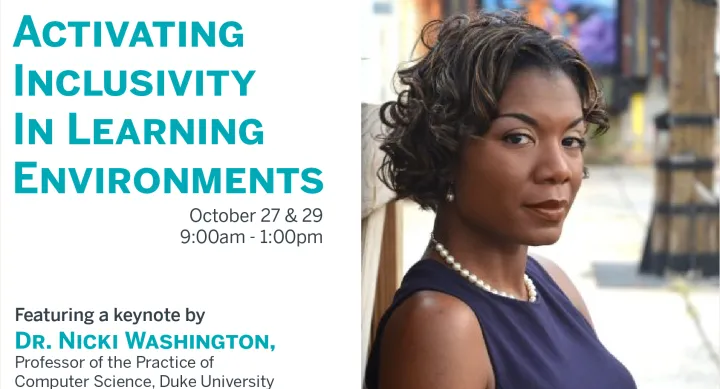
The Inclusive Teaching and Learning Fall Symposium, which took place on the mornings of October 27 and 29, was our first attempt at a completely virtual full-length Symposium, and we were delighted and inspired by the immensely impactful workshops presented. This Symposium, themed around Activating Inclusivity in Learning Environments, was headlined by Dr. Nicki Washington, Professor of the Practice of Computer Science at Duke University, and also included five complementary workshops that focused on actionable steps towards building more inclusive and anti-racist classrooms. Below are some of the highlights of this event, as well as links to some of the resources provided by workshop facilitators.
Dr. Nicki Washington began her keynote, “Look for the Helpers: Creating and Maintaining a Culture of Inclusion, Advocacy, and Activism in Computing” by inviting us to get beyond allies and into advocacy and activism. Dr. Washington discussed not only covering important terminology, strategies, and resources to begin activating anti-racism in your pedagogy, but also reminded us that our students are at the heart of why this work is important and immediate.
*You can view the recorded keynote address, with captions, on our Vimeo Channel.
In addition to Dr. Washington’s powerful keynote were five workshops presented by members of the UT community. Each of the workshops had a unique focus, but a common thread throughout was that of creating tangible takeaways or next steps for participants. Along side each session is a link to any handouts, slides, or other materials that the presenters shared for participants to engage with both during and after the Symposium.
Whose Voices are Missing? Navigating Power Dynamics to Diversify Voices in the Classroom
Facilitated by Kaitlyn Farrell, Graduate Student, English—participants engaged with a processing template to reflect on how they can use their power to rethink course(s), amplify diverse student voices in your classroom, and commit to promoting inclusivity and antiracism in classrooms and departments this semester and in the future.
Use of the Inclusivity Checklist as a Means to Promote Inclusive and Anti-Racist Teaching
Facilitated by Monica Hall-Porter and Brandon Campitelli, Texas Institute for Discovery Education in Science—attendees were encouraged to explore and share the impact of racism on their fields of study, engaged in active discussion of the current inclusivity checklist, and began the process of editing the list in a discipline-specific manner and to consider ways that it can be adapted for more general use.
Embodiment and Feedback: Drama Techniques for Receiving Feedback about Inclusivity
Facilitated by Kairos Looney, Graduate Student, Theatre and Dance—attendees gained the following takeaways from this workshop: 1. Increased awareness of how many bodies instinctively respond to feedback. 2. Tools for responding more openly. 3. Questions they can ask themselves to think critically before offering feedback themselves.
Imposter Syndrome and the Learning Environment
Facilitated by Nisha Saif, Camila Bohorquez, and Christy Gao, CMHC Undergraduate Peer Educators—attendees were provided ith recommendations that can be implemented to promote a more inclusive learning environment and reduce imposter syndrome among students. Specifically, this included ways to promote a growth mindset in the classroom, methods for building valuable learning experiences with less dependence on grades as a measure of success.
Facilitated by Sahtiya Hosoda Hammell and Whitné Mousson, BeVocal—this workshop utilized a three-step action plan of 1) recognizing potential harm 2) choosing to respond and 3) taking action. Participants learned how to help individuals make the LEAPS from being defensive about causing harm by Listening, Empathizing, Asking Questions, Paraphrasing and Summarizing as well as how to offer THANKS (Thanks, Hold your tongue, Apologize, Network, Know better and Do better, and Share Ideas) when mistakes are made.
Finally, the event was completed by a special Q&A Session for Graduate Students with Dr. Washington. The overall sentiment was for students to navigate their graduate school experience in, “conviction and not questioning,” as we all work to dismantle practices and cultures that promote imposter syndrome and instead activating inclusivity.
This Symposium was hosted by the Center for Teaching and Learning, was made possible by the Mellon Foundation “Creating a Shared Culture of Inclusive Pedagogy” grant, as well as co-sponsorships from the Department of Computer Science, the Women in Engineering Program, the Texas Discovery Institute for Education in Science, the Cockrell School of Engineering, and the College of Natural Sciences. We hope you are able to engage with the resources above, and we hope to see you at the next Inclusive Teaching and Learning Symposium in Spring 2021!

